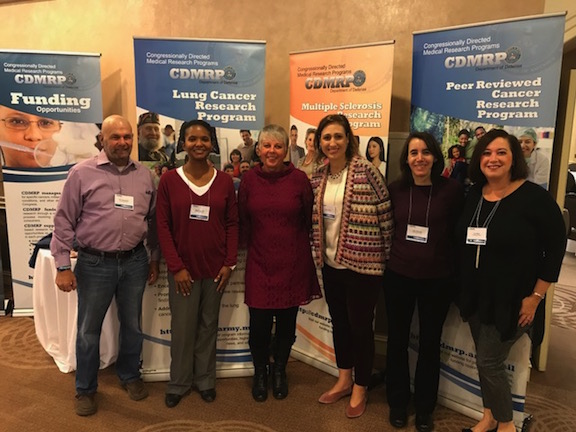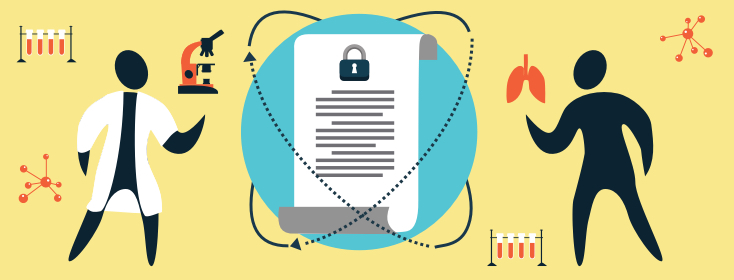Patients and Scientists Work Side By Side on Research Proposals
I am excited and hopeful about new research proposals for lung cancer! I wish I could share with you some of the things I have been privy to as a patient reviewer with the Lung Cancer Research Program.
But, alas, I am sworn to secrecy!
The Role of a Patient Research Reviewer
For the past several years, I have had an opportunity to provide my perspective as a lung cancer survivor/advocate about proposed research projects. It is very hard work, but so exhilarating to see what these researchers are proposing.
There is a way for you to be a part of this. The Lung Cancer Research Program is always looking to recruit new patients. LUNGevity’s Katie Brown recruited me about five years ago.
I would like to impress upon lung cancer patients the importance of giving voice to our cause and the greater lung cancer community we represent as patient advocates.
I am a longtime lung cancer survivor. I just celebrated my 12th cancerversary. It used to be rare to see long-term lung cancer survivors. Research is the reason we are seeing more survivors now. Research is what the Lung Cancer Research Program is all about.
When Science Doesn't Come Easily
I want to share a personal story from my college days. I struggled with science. I did not have a good foundation from high school. Even though I was an honor student, science was very difficult for me. In fact, the only class I received a D in was biology. Because that D would not transfer, I had to retake the course. I have no idea how I got a B the second time I took biology. I think my professor felt sorry for me because she could see that I really was trying.
I got through college, earning undergraduate and graduate degrees in journalism. I was a journalist for 10 years and earned several press association writing awards. After leaving journalism, I worked for several years as the communications manager at a large law firm. From there, I worked in media relations at a university.
I am sharing this for several reasons. First, if you struggle with science—like I still do—you are not alone. As I review these scientific proposals, I can’t tell you how many times I've had to Google a word to find out what it meant.
The Value of First-Hand Experience
More importantly, I cannot emphasize this fact enough: The scientists know the science, but they do not know what it is like to be a lung cancer patient. It is our job to impart our insights to them. You can’t Google “lung cancer survivor” to understand what that means. Only those of us who have walked this journey can truly understand.
The Lung Cancer Research Program brings patients and scientists to the same table. The patient experience is valued. Patient votes carry the same weight as the scientist sitting next to them. Thankfully, patients are not expected to know the science like the scientific reviewers. What we bring to the table is something people cannot learn from books. What we bring to the table is the impact that our experience has made upon our lives.
By taking time to study and critique research proposals, patients are speaking for hundreds of thousands of patients…even those who no longer have a voice. Yes, that is a weighty responsibility.
Hope for a Better Future
As I read research proposals and comprehend their potential impact, my heart is stirred with excitement and hope. We have the opportunity to be part of something very special that may significantly improve the lives of others...people we do not even know. We do not do this for ourselves. For the most part, this research will not directly benefit us. Nevertheless, these scientific advances will become a reality for those diagnosed in the near future.
If you would like to apply to be a part of this program, here is a link to the application. You will need endorsement from a lung cancer nonprofit. If you already have a relationship with a lung cancer nonprofit, ask them to sponsor you. LUNGevity, Lung Cancer Alliance and other organizations often do this. My organization, LiveLung, also has done so.
You have a voice! Use it to make this world a better place for others.

Join the conversation